10 Things to Do Before Your Meal to Prevent Overeating

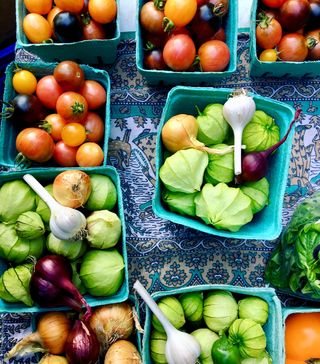
Food brings so much joy but can also feel taxing. There are times when we lean on food in ways that may not be the best for our bodies. "Comfort food," as we all know, feels nice in the moment but later can actually cause more discomfort. When you're stressed, tired, or unhappy, overeating is easy to do. Eating on impulse, rather than to nourish our bodies, is a habit that often feels satisfying but isn't in the long run. Alternately, there are practical ways to trick your mind and flip your eating habits into working for you, not against you.
Self-control when it comes to food takes practice. So don't be too hard on yourself. It's in your best interest to break the cycle because overeating can lead to heart disease and diabetes. Compulsive overeating syndrome is a term used to describe night eating, feeling too full, impulsive eating, and compulsive food behaviors. To help turn these habits around, Tanya Zuckerbrot, NYC-based registered dietitian, best-selling author, and founder of the F-Factor diet, and Ilana Muhlstein, co-creator of the 2B Mindset, break down how to prevent overeating below.
These are the Most Common Causes of Overeating
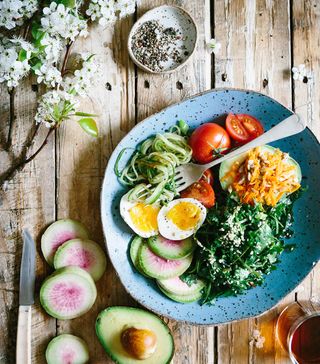
#1. Skipping Meals
If you find yourself skipping meals on a regular basis, depriving yourself of food for hours at a time, it could be causing you to eat more. "This starts to conserve fuel and burn fewer calories to protect itself from starving," Zuckerbrot explains. "Your metabolism then slows down, therefore inhibiting weight loss despite reduced caloric intake."
Muhlstein emphasizes the adverse effect skipping meals can have on your eating habits. "So many people skip breakfast and don't have a sensible lunch, which can make them very vulnerable to overeating when they see food later on," she says.
#2. Dehydration
"Not many know this, but oftentimes thirst mimics hunger, so we eat when we truly need a glass of water," Zuckerbrot reveals. "Over time, ignoring your thirst signals and not staying hydrated can affect hunger signals and lead to overeating." Muhlstein echoes this point and says that water is more essential to our daily survival than food.

#3. Overconsumption of Refined Carbohydrates
When you eat a lot of carbs, sugar infiltrates your bloodstream super fast. In turn, this prompts sugar crashes and spikes in your blood sugar. "When your blood sugar crashes, you feel weak, shaky, cranky, tired, and hungry soon after eating your last meal or snack," says Zuckerbrot. "That's why even carbs that don't taste sweet, like bread, rice, or pasta, can make you crave more food soon after you eat them."
#4. What You're Eating Lacks Nutrients
If what you're eating are cookies and chips, Muhlstein encourages you to switch up your food palette to more satisfying foods. "It doesn't matter how much you eat; it matters what you are eating," she says. "Water, fiber, and protein make us feel full and help us stop eating. However, if you are overeating food lacking those nutrients, it is hard to register the need to stop. This makes it easy to keep eating and feel really uncomfortable later, physically and emotionally." The other thing that could be causing you to overeat is something Muhlstein calls open-ended foods. "I coined the term open-ended foods to describe the foods that don't make it clear when to stop eating them," she explains. "Examples of open-ended foods are crackers, chips, pretzels, nuts, popcorn, and bowls of candies. Often, people don't even realize they are eating when they are overeating these highly addictive foods. They are hard to track and don't keep you full or satisfied."
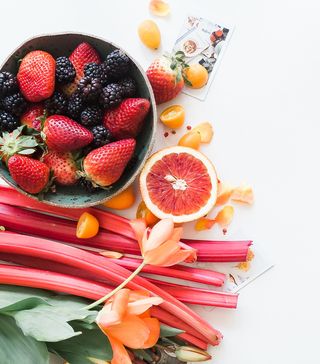
#5. You Could Be Associating Food With Your Emotions in the Wrong Way
We get it; a hard day calls for comfort food. However, adopting this habit too often will result in overeating because you're not actually hungry. You're associating food with your emotions. "You are trying to solve a problem that won't be solved by eating," Muhlstein elaborates. "So often people tell me that they overate because they had a hard day or were upset about something unrelated. It's too easy to confuse eating as therapeutic, which can lead to many bouts of overeating."
#6. You See It, So You Eat It
"In sight, in stomach," Muhlstein calls it. "Most of the time, we don't go to a party with the intention of stuffing our faces, but it happens anyway. We also don't typically intend on eating the whole bag of candy when we purchase it from the store. If you don't buy it and have access to it in the first place, you will lower the risk of overeating it later on."
Tips to Curb Your Urge to Overeat That Your Body Will Thank You For
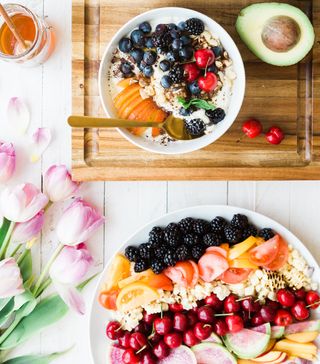
#1. Try Using Smaller Plates
Zuckerbrot recommends relying on age-old mind games that'll work in your favor. "Our minds play tricks on us," she says. "When the same amount of food is on both a larger plate and a smaller plate, it looks like more on a smaller plate and less on a larger plate. We perceive that we then have eaten more and feel more satiated after consuming the food on the smaller plate, and the opposite with the larger plate, which can lead to overeating."
#2. Double Up on Your Fiber Intake
Why fiber? For starters, it has absolutely zero calories and it's a non-digestible part of a carbohydrate that bulks up your meals. "When you follow a diet rich in fiber, you feel full after eating," Zuckerbrot explains. "So you'll generally eat less throughout the day. Fiber swells in the stomach, absorbs, and removes fat and calories, and boosts metabolism. The average American eats less than 15 grams of fiber per day. Women need 35 grams of fiber daily in their diets. I recommend aiming for 40 grams for optimal weight-loss results."

#3. Practice Mindful Eating
Zuckerbrot says you can do this by simply taking smaller bites and eating slowly. "It takes 20 minutes for our brain to even realize we are full," she adds.
#4. Go About Your Meals in a Sensible, Step-Wise Fashion Like This
Do you take on habits faster when they're outlined for you? Same. There's something about breaking things down that feels so simple and easy to follow. Because of this, Muhlstein created a 2B Mindset program, which confronts head-on the vulnerabilities that come with overeating and how to end those habits for good. This is Muhlstein's model:
Step 1: Start every meal with drinking water first so you'll feel fuller. "I always start every meal by drinking water first, which makes me feel full, and more alert and aware. Plus, drinking water forces us to breathe slower which helps us calm down when feeling overly emotional or anxious. Drinking water first before all your meals and snacks may not be easy right away but once you get the habit, you will be so happy you did," she says.

Step 2: Make your first bite from your meal a vegetable. "Veggies, like cucumbers, lettuce, and peppers, are the lowest-calorie foods that actually make you feel full because they are high in water, fiber, and volume. They add weight to your stomach so you feel fuller sooner, which can prevent overeating later," Muhlstein explains. "Also, if your first bite is a veggie, you will be more likely to eat more veggies, versus if your first bite is a cookie, it can feel slightly harder to choose a salad next."
Step 3: Next, reach for a protein. "Protein keeps us fuller longer," she continues. "If you don't eat protein, you may never feel that sense of satisfaction that encourages you to stop eating. I always keep quick proteins around, like eggs, Greek yogurt, Shakeology, salmon jerky, and protein bars, to ensure that I am satisfied from each meal and don't overeat later on."
Step 4: Save your carbohydrates for last. "I find them to be the easiest food group to overeat. After drinking lots of water, and eating veggies and protein, it becomes much easier to stick to a serving of carbs like crackers, popcorn, or fruit. If I want to keep eating more and start to risk overeating, I push myself to go back to drinking water first before taking seconds," she concludes.
Ways to Recognize If You're Overeating
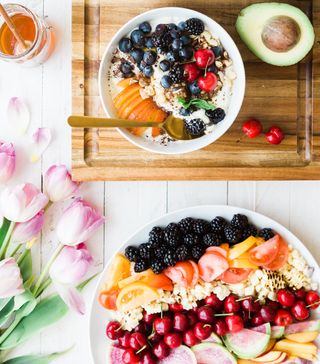
You know when you feel full? That means you've passed the point of overeating, according to Muhlstein. "It takes 20 minutes for the nerve signal from your stomach to reach your brain to tell you you're full," she explains. "Paying attention to the speed at which you're eating will help a lot. By slowing down, you're giving your body a better chance to tell you you're full before you've reached that have-to-unbutton-my-pants feeling.”

Try journaling and logging all the food you're consuming. You'll easily be able to see what you're eating too much of, like carbs.
The Healthiest Foods to Prevent Overeating
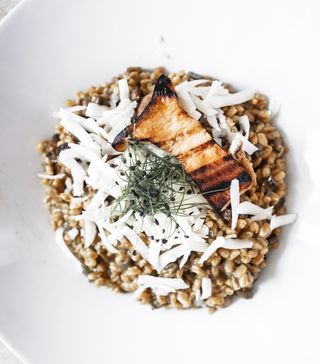
Muhlstein calls them one-and-done foods. "They are foods that are individually wrapped to prevent overeating," she explains. "Ideally, they will have some fiber and protein as well. Think a carton of Halo Top ice cream, a chocolate and peanut butter BeachBar, a single serving bag of SkinnyPop."
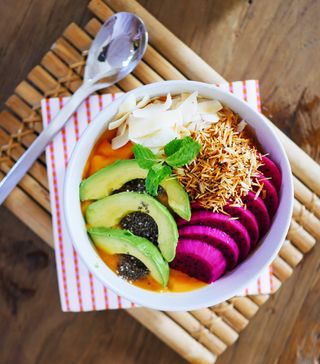
Zuckerbrot suggests pairing fiber with lean protein. "The combination of fiber and protein will keep your blood sugar stable, therefore preventing excess snacking and cravings, which aids in weight loss, too," she explains. "A classic example is sliced vegetables or high-fiber crispbreads with a lean source of protein like low-fat cheese. The pairing will keep you full for hours. Also, a mid-afternoon snack with at least 15 grams of fiber so that you never enter dinner starving."
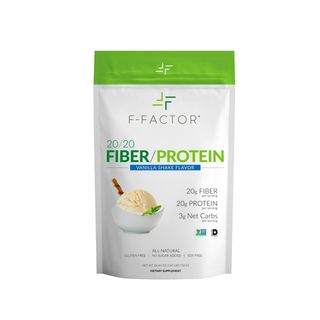
"An F-Factor 20/20 Fiber Protein Shake is a perfect afternoon snack with 20 grams of protein and 20 grams of belly-filling fiber," Zuckerbrot recommends. "Throughout my years in private practice, clients would often ask me to recommend the highest-fiber items available. I scoured the marketplace for products which fit the F-Factor guidelines. While I did find some products, I knew they could be even better. They could taste better, have more fiber, and be all-natural. There was a clear void in the marketplace for great-tasting high-fiber products, and I knew I had to change that in order to enhance the F-Factor experience. This product does just that."
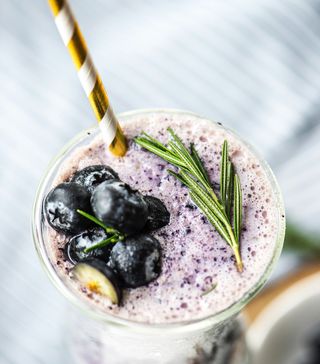
Muhlstein is also an advocate of sparkling waters and all-natural, calorie-free drinks, like Stevia, which she keeps cases of nearby.
Next: Here's how to build a happier relationship with your diet.
Disclaimer
This article is provided for informational purposes only and is not intended to be used in the place of advice of your physician or other medical professionals. You should always consult with your doctor or healthcare provider first with any health-related questions.